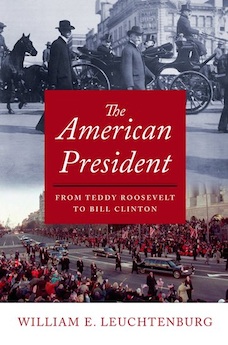By Sarah Gustafson
The American President by William E. Leuchtenburg strikes a balance between detail and the kind of discriminating, overarching description necessary to grasp the big picture of one of the most powerful institutions in the world, the presidency of the United States from Teddy Roosevelt to Bill Clinton.
Leuchtenburg excels at differentiating the personalities of the different presidents. He draws them sharply, not dousing the reader with lots of biographical information. You get the absolutely necessary details, those critical to understanding the strengths and insecurities presidents brought to and continued to act on throughout their tenure. He focuses on explaining the constraints within which each president found himself at the beginning of his term, and how he played with those constraints, to the betterment or worsening of the office.
Sometimes the president played legally, other times illegally, sometimes without rebuke, other times accompanied by the political warfare, scandal, failure of faith, disappointment, and dishonesty that characterized various court-packing schemes, executive actions, personal indiscretions, Watergate, Monica Lewinsky, and Whitewater investigations, and still other moments.
Leuchtenburg presents this book, which asserts the modern presidency began with Teddy Roosevelt, as a correction of his earlier belief that the modern presidency began under FDR. Yet, in many ways the presidency, as he writes it, comes alive only after FDR passes away. The book takes on a different energy as the presidency becomes demonstrably more modern and has to work through the challenges of a world dominated by technology, media, and globalization.
The presidents, too, become more modern and vulnerable to our penetration; all of a sudden Leucthenburg sprinkles chapters with expletive-laden quotations that condemn political opponents, minorities, or women, for example. But it would take supernatural discernment to say whether that change from the high and mighty to the more human demonstrates the evolution of the office or the trends concerning whom we elected. The answer is, probably both.
This thought raises one profoundly reassuring part of this book—the fact that our presidents are human and frail. It remains true no matter what pomp and circumstance we invest in the office, no matter how well we say they did in the role at a particular time, and no matter what external forces affronted them. One of the great things Leuchtenburg does is to extract the irony in each president’s tenure.
Teddy Roosevelt, the New Yorker, made his most lasting impression as a great environmentalist and cowboy. Woodrow Wilson the progressive in international human rights was profoundly regressive in civil rights here at home. Harry Truman, whom FDR explicitly and unjustly kept out of all affairs while Vice President, later listened to Winston Churchill tell him “I misjudged you badly… you more than any other man have saved Western civilization.” Kennedy, Richard Nixon, who could scarcely be bothered by domestic affairs, presided over a dramatic expansion of the federal government, particularly in environmental regulation. Ronald Reagan, a hero for his tax plan, left the country with a national debt that crippled his Vice President and successor. Bill Clinton—whom Toni Morrison called the first black president—passed incarceration laws later deemed hostile to the black community, and often took up so much room in the center, he could scarcely be called a Democrat. One thinks too, though it is not in this work, of George W. Bush’s campaign as a “Compassionate Conservative” and the direction his tenure rapidly took after the tragedy of September 11.
History has a sometimes cruel and ironic sense of humor. And despite it all, Leucthenburg demonstrates that the United States and the presidency continue.
It may be hard not to read The American President with the current election in mind. Of course, if you choose not to, the book will stand on its own. But no matter where you fall this election season, it is powerful to see what America has withstood from her most recent century of presidents. It puts 2016, and all presidential contests, in the context of a never-ending discussion of appropriate executive power and appropriate executive temperament, or in Leuctenburg’s closing words “a conundrum that every generation of Americans is fated to try to resolve.”
Sarah Gustafson (ΦBK, Davidson College, 2014) has a master’s degree in history of political thought and intellectual history from University College London, where she won the Quentin Skinner Prize for her dissertation on Alexis de Tocqueville. Currently based at the American Enterprise Institute, she looks forward to her pursuit of a PhD in European and intellectual history.




